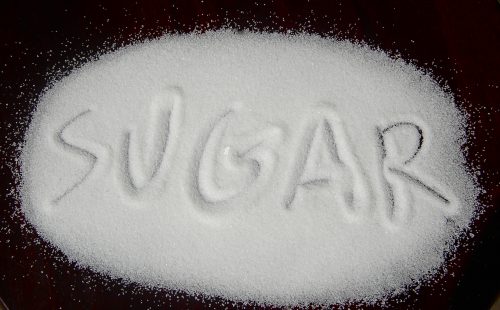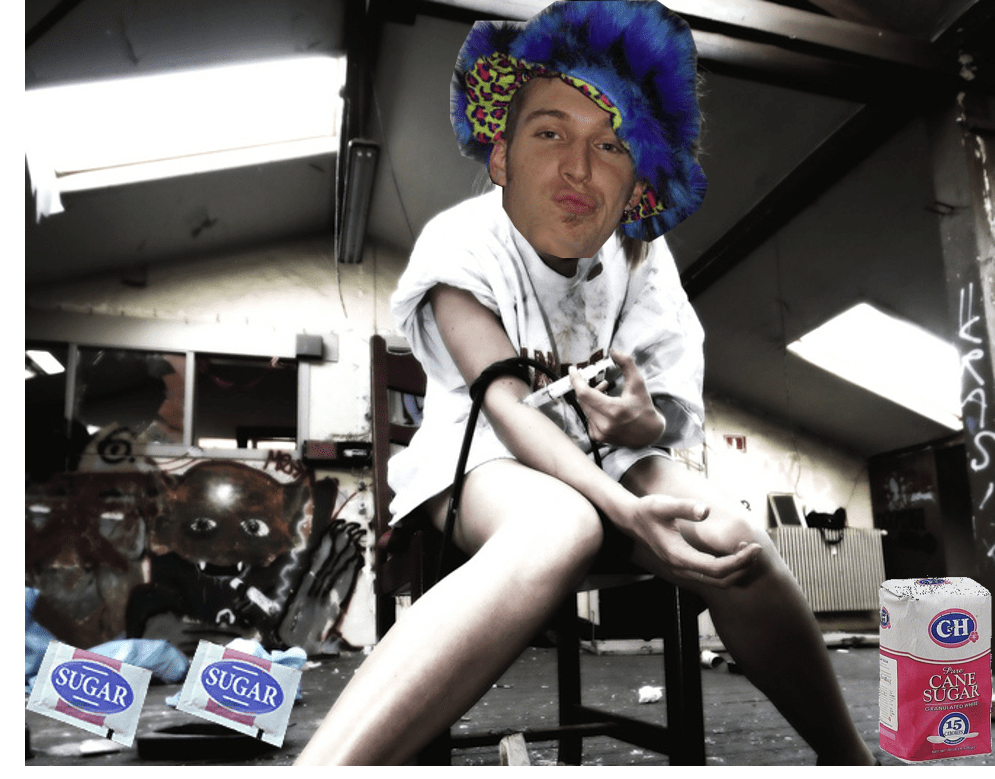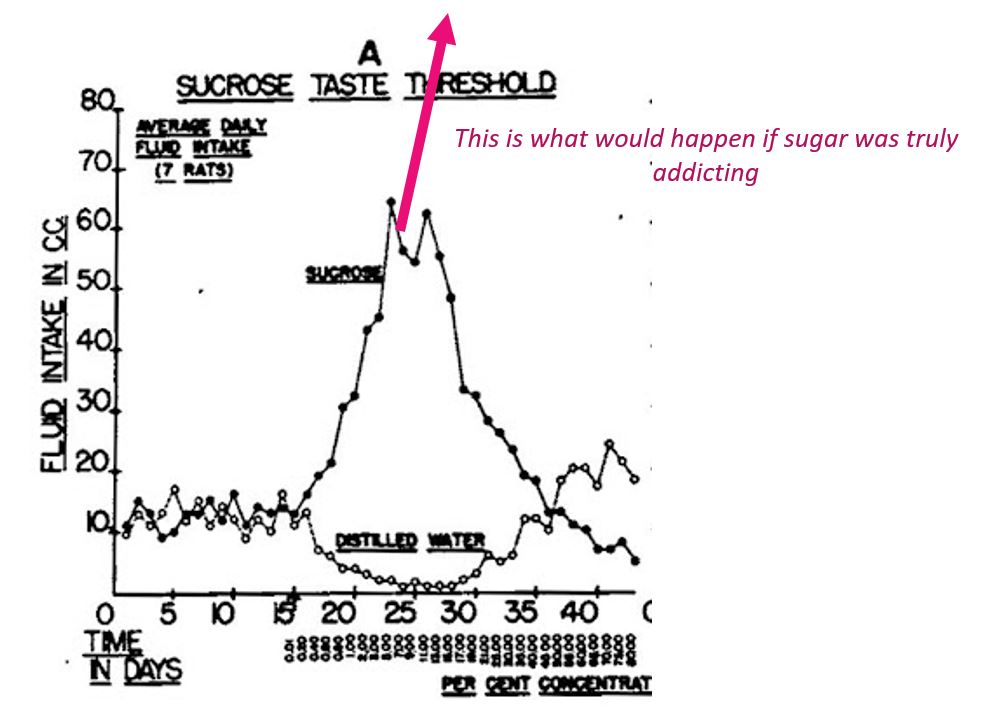
No, You’re Not Addicted To Sugar
I recently gave a presentation on sugar at the Inland Empire Fitness Conference in Bro-kane, Washington. My friend Tim Arndt, who put on the conference, posted one of my summary slides on Facebook…a summary slide that would cause quite a stir. It was this line that caused the stir.
The post got shared around and people started to argue with this particular line, even throwing out studies they felt proved this line wrong.
Well, if you think you’re addicted to sugar, I’m going to tell you right now…
…YOU’RE NOT…
…and let me explain why.
MAINLINING SUCROSE
The easiest way to get my point across is to ask you this question: do you find yourself consuming straight bags of sugar uncontrollably like Bret Contreras here?
If not, you’re not addicted to sugar.
Do you find yourself injecting your veins with pure C&H like Eric Helms here?
If not, you’re not addicted to sugar.
BUT…BUT…HOEBEL…
The point here is that sugar is not addicting in and of itself, certainly not in the way that truly addictive drugs are. If sugar was addicting, you would be hoarding bags of sugar and spooning it straight into your mouth.
Of course, when I point this out, people are quick to cite research by Bartley Hoebel that supposedly showed that sugar is more addicting than cocaine in rodents. However, Hoebel did not show that sugar is more addicting than cocaine. He only showed that cocaine can increase dopamine levels in the brain in a manner similar to food reward. He also co-authored a paper entited "Evidence for Sugar Addiction", outlining some behavioral similarities between drug self-administration in rodents, and intermittent access to sugar. However, what people fail to realize is that the set of conditions which create addiction-like behaviors in sugar-consuming rodents is not applicable to humans.
THE CONDITION FOR ADDICTION
The fact is, addiction-like behaviors, such as bingeing on sugar, only occur when you give rodents intermittent access to sugar. For example, I might deprive rodents of food for 12-16 hours, and then give them free access to sugar for 8-12 hours. Under these specific conditions, using rodents that have been selected to have a preference for sugar (unlike addictive drug studies where rodents completely naïve to a drug are used), I can produce addiction-like behaviors.
But when I give rodents ad libitum access to sugar (meaning they can have it whenever they want), I don't get addiction-like behaviors.
Which do you think is more relevant to humans? Of course the ad libitum condition is more relevant. We can have sugar whenever we want to. There's no giant Brad Dieter in a lab coat keeping the sugar from us.
And if the sugar is not in our house, we can run to the store to get some. Our access to sugar is not intermittent.
NEGATING WITH NAUSEA
Another key distinction is that, unlike addictive drugs, rodents with prolong access to sugar remain susceptible to devaluation. Basically, if I add something to sugar that makes rodents feel sick, they will stop eating it. This is not true with addictive drugs; rodents will continue to seek out a drug even if I add a nauseating agent to it.
You think you're addicted to Oreos? I guarantee you would stop eating them if I added something to them that made you vomit each time you ate them.
So, no, you're not addicted to Oreos.
CRAVING CONTRAST
Another distinction between drugs and sugar is that the cravings are different. Food cravings are very different from drug cravings; they are different in terms of intensity, frequency, and duration. Food cravings are relatively short-lived compared to drug cravings; cravings can actually subside with fasting, but drug cravings persist and do not reduce in intensity even with prolonged abstinence from the drug. Food cravings are not a reflection of addiction to a particular food. Rather, food cravings are related to a certain attitude towards a food. Let's use chocolate as an example, a food that some people might call "addictive". For some people, chocolate is a highly desirable food...it tastes extremely good. However, we think that chocolate is something that should be eaten with some restraint. When you try to restrain your intake of chocolate, it magnifies the importance of it, and you become preoccupied with it. This is experienced as craving, and people start making comparisons to addiction. But this is not addiction.
SUGAR...NOT ADDICTING SINCE THE 1940'S
Research published all the way back in 1940 demonstrated that sugar is not addicting. Scientists looked at how sugar concentration in water impacted how much rodents drank. They found that rodents would drink more as sugar concentration increased, but only up to a certain point. Once the sugar concentration got too high, they would drink less. In fact, at very high sugar concentrations, they would drink less than if the water was plain. This is not what would happen if sugar was addicting; rather, they would continue to consume more as the concentration increased.
So what's going on here? It's simply an issue of palatability. Sugar enhances the palatability of water; it makes it taste better. However, if the sugar concentration starts to get too high, it no longer tastes as good, so you won't drink as much. At a really high sugar concentration, it tastes so bad that you'd rather have plain water. That is not the hallmark of an addictive substance. This leads me to my next point...
IT'S THE PALATABILITY, STUPID
Sugar is not addictive. However, it can make our food taste damn good, which encourages us to eat more. For example, if you knock out sugar taste receptors in rodents so that they can't taste sugar, they are resistant to fat gain when you give them sugar water. If you then add fat to the sugar solution to enhance the palatability, the rodents will get fat, even if they can't taste the sugar. Thus, overeating food is highly related to its palatability, not due to any unique addictive property of sugar. In fact, people on a high sugar diet will lose a lot of weight if the diet is very bland so that they don't want to eat much. Also, palatability, not sugar content, is a predictor of how much people will eat.
The fact is, highly palatable, highly rewarding foods can override our natural appetite signaling mechanisms, and pleasure/reward can share some of the same brain pathways as addiction. Thus, highly palatable, highly rewarding food can have some addictive-like qualities, and can be very tempting and easy to overeat, but it is not truly addictive. Sugar is a component of food that can enhance its palatability and reward value, which increases the likelihood of us overeating a food that contains it. But this doesn't mean sugar is addicting.






Saw something on the BBC where it was actually the combinations of sugar and fat (butter) that made food so tasty that people wanted it, craving or what not.
Eat a spoon of sugar? Yuck
Eat a sooon of butter? Gross.
Mix them together – ok, spread on toast it’s pretty yummy (as a child I used to eat this!)
I live for science based outcomes!
This seems like a distinction without a difference.
If thousands of people lose limbs every year from Diabetes, and there are endless andecdotes of people driving to 7-11 at midnight for candy, does it really mean anything if it’s not clinically addictive?
How about talking about what is happening, and solutions to the very real problem, whatever you want to call it?
“does it really mean anything if it’s not clinically addictive?”
Yes, because it leads to the wrong solutions. If sugar itself is not addictive, then claiming it is can lead people to unnecessarily avoiding sugar at all costs. Demonization of any particular nutrient is not the way to go.
Interesting But I did hoard and search out sugar. I would plan my next fix. I would get irritable if I didn’t have my next “hit” accessible. I got angry if someone interrupted my fix, if someone took my fix, or tried to talk to me while I was enjoying my fix. I spent tons of money on my fix. I would go out in the middle of the night to search for a fix. I would drive place to place to get a fix. And I hid the extent of my use from loved ones. It interfered with my… Read more »
Nope. Definitely not
I think the answer is “yes.” Sugar may not be addictive, yet people can be addicted to it…because people can be addicted to anything rewarding or pleasurable, even if most people are not addicted to it.
Sex isn’t inherently addictive, yet there are recovery groups for “sex addicts” who are addicted to it, who ruin their lives seeking it, who can’t go a day without it, and so on.
“The fact that sugar elicits ‘similar’ responses in the brain as drugs does not make it addicting. (So do sex, shopping, gambling, exercise & petting puppies- lol) For something to be an addiction it must change the structure of the brain and how it works. Thus far, sugars effects are only temporary thus it is not truly addictive as much as people toss that word around would like to believe it is. Nope. However, I will change my thinking when people are pimping their children for a 5lb bag of sugar or commiting suicide off it. I’ve been on a… Read more »
Exactly, Duff. Like I said, this group of guys act like they are all knowing, when we all know that science gets things wrong more than they get things right. I know that people have sugar addictions, I did for sure. Science also says that marijuana isn’t addictive either, but it was very hard for me to stop
Jonny if I gave you a 5lb bag of sugar and force fed it to you you’d get pretty sick if it fast.
The behavior is addictive, not the substance, and the sugar was connected to the addictive food behavior for you. An addictive behavior can interfere with your day to day life, but it’s not the same as substance abuse. So yeah, you would have been addicted to the behavior, but not to the substance. The difference? You are more susceptible to replacing another food to have addictive behavior to, or having another behavior take it’s place.
I don’t have withdrawal symptoms, but do find that too much sugar causes depression and irritability. Everyone’s bodies work differently, we aren’t rats, alas, and the placebo/nocebo effect is extremely strong with some of us. Some love the taste of sugar and others can easily live without it. But when ones biome is off kilter, then I believe the craving to feed that biome can be quite intense. I think with body builders eating some sugar might be fine. You have so much else going for you in your body that it’s not a huge issue. I do think you… Read more »
How do you change your taste for sugar?
Hey James, I did read an interesting narrative review on “sugar addiction” although I have to admit I did skim through it. The authors used bingeing, withdrawal, craving & sensitization as the diagnostic criteria for addiction or dependency. They went talked about several rat studies that demonstrate this (again, no time for an in depth lit review so i’m assuming no bias). They essentially concluded that “rats with intermittent access to food and a sugar solution can show both a constellation of behaviors and parallel brain changes that are characteristic of rats that voluntarily self-administer addictive drugs”. With this one… Read more »
Great article. Been reducing sugar for a while now and find it beneficial to my mood and general feeling of well being. Have cravings occasionally but in comparison to my rehab experience for substance abuse there is absolutely no comparison. Being force fed so much sugar in processed food probably isn’t the best for health but the palatability explanation for Tim tam necessity makes a lot of sense. Thanks
Johnny come home, you’re done mate.
Exactly my point, go from high carb to low carb and you will see a incredible difference in how your mind and body respond to carbs. And you will see how much they had a hold of your diet. All the low carb studies that have been done have been too short term to show the true benefits of a lower carb diet. So all we have left is anecdotal evidence to show it’s true benefits, not just in sustainable weight loss but in overall better health. I find it ironic that eating sugar is preached by you guys so… Read more »
You’ve never heard of IIFYM or flexible dieting? Look at how lean those guys get. I too have stepped on stage whilst incorporating sugar into my diet onto a daily basis and lost 27kg of fat in the process. Your comment shows your lack of understanding.
*on a daily basis
*in very small quantities
That is iifym BY DEFINITION.
Um …I’ve gotten pretty damn lean with some sugar in my diet, including my daily coffee, cream and sugar
Drug Free Pro Bodybuilder checking in & I & many others do NOT completely cut sugar, from foods or plain regular sugar, from my diet ever. Calories, macros & micros, vs activity level shows the truth of the physique.
Too short term? There are 1-2 year studies comparing low carb to high carb diets, with little to no difference in outcomes between them.
Like hell there are. The longest metabolic ward study is only 2 months long. No we’re near enough time.
There are plenty of long term (1 year and more) studies. Here’s a sample:
https://www.ncbi.nlm.nih.gov/pubmed/27010424
https://www.ncbi.nlm.nih.gov/pubmed/26527511
https://www.ncbi.nlm.nih.gov/pubmed/19692216
All your examples are free living study. This lead to bias.
I lost a lot of stubborn weight (like 20 pounds down to a BMI of 20) on a high sugar (fruit and refined) diet ala Ray Peat’s recommendations. My body comp is good and my weight is more stable than ever. The problem is battles of anecdotes aren’t worth much.
Good god this is idiotic. Don’t eat sugar or chips for a week and see how much withdraw you have. It isn’t like heroin, but of course the body, especially the taste buds, become addicted. I am so tired of people like you that say “if it can be proved in a lab, then it’s not science” that is incredibly short sighted.
“Don’t eat sugar or chips for a week and see how much withdraw you have.” Unless you are on a very low carb diet, it’s pretty tough to go without sugar for a week since sugar is naturally present in many foods. I’ve gone without chips for weeks. No withdrawal. “It isn’t like heroin, but of course the body, especially the taste buds, become addicted” The body does not become addicted. I don’t think you understand what “addiction” means. And taste buds don’t become addicted either. “I am so tired of people like you that say “if it can be… Read more »
Had to chuckle at withdrawal after not eating chips for a week. I stopped eating chips 7 years ago, because they were a “trigger” food for me. I would eat them way to often and overconsume when I did eat them. With each week that passed, I never experienced any type of withdrawal symptoms. In fact the longer I avoided chips the less I wanted them. Seven years later, I will try a chip or two and think, “meh”… I really have no taste or desire for them anymore. As for sugar, I was never really blessed with a sweet… Read more »
Great comment Kim. The other funny thing is that chips aren’t even a sugary food, so not sure why Johnny would use them as an example.
I had strong cravings for sugary, highly palatable junk food for 2 years after eliminating such foods for my diet, and I had unsuccessfully tried to eliminate them for over a decade before succeeding. Sugar may not be technically addictive (after all, I still consume sugar in fruit and many other sources, just not in junk food), but it can still be extremely difficult for people to quit the highly palatable stuff. In fact, most people would rather eat themselves to death than make dietary changes.
“As for sugar, I was never really blessed with a sweet tooth… so sweets have never really been a issue for me.” might be a blessing but I am more of a salt person so not so blessed. According to 23andme DNA testing I am a salt person and not blessed ( and according the same testing site I can lower my BP by eating less salt ), yet I love cakes and donnuts. My take on reading articles on James’s site is I get more a sense of freedom to chose what to do the yields results everytime. I… Read more »